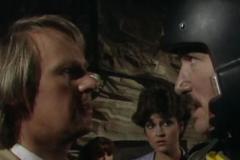 The tenth in our series of features looking at events leading to the creation of a true TV legend. The story so far: After a number of meetings and reports within the BBC to decide on a new TV show to fill a scheduling gap late on Saturday afternoons, drama boss Sydney Newman has given the go-ahead for a science-fiction series of serials featuring four time-travellers. One of those travellers will be a mysterious, grumpy, frail, and elderly man on the run and cut off from his own distant civilisation. As the programme - still without a title - takes embryonic form, it has been decided that it will be made at Lime Grove, with recordings starting weekly on Friday 5th July 1963 and the transmission of the first of 52 episodes scheduled for Saturday 27th July.
The tenth in our series of features looking at events leading to the creation of a true TV legend. The story so far: After a number of meetings and reports within the BBC to decide on a new TV show to fill a scheduling gap late on Saturday afternoons, drama boss Sydney Newman has given the go-ahead for a science-fiction series of serials featuring four time-travellers. One of those travellers will be a mysterious, grumpy, frail, and elderly man on the run and cut off from his own distant civilisation. As the programme - still without a title - takes embryonic form, it has been decided that it will be made at Lime Grove, with recordings starting weekly on Friday 5th July 1963 and the transmission of the first of 52 episodes scheduled for Saturday 27th July.Round about the beginning of
May 1963 - 50 years ago this month - BBC staff director and producer
Rex Tucker is placed in temporary charge of the programme while the search is made for somebody to take on the role of producer permanently. Tucker is a BBC veteran who has experience of classic serials and drama for children, and at a meeting with Newman he is told the format of the new series. With them is
Richard Martin, who has recently finished the BBC's training course for directors, and the idea is that Tucker will helm the first serial and Martin other early ones.
During later talks, the fledgling show is finally given a name -
Dr. Who - with Newman being credited as the person who came up with it
Script writer
Cecil Edwin "Bunny" Webber had earlier drawn up an initial character and set-up plan. After some robust feedback from Newman, he now comes up with a draft document entitled
General Notes on Background and Approach, aimed at potential writers for the show. Running to three and a half pages, it provides outlines for the four main characters, all of whom apart from the Doctor are given proper names for the first time. It also makes a bold suggestion as to how the space-time machine could be realised, gives the first episode its title, and describes the overall continuity of the series, its format, and what is being looked for in terms of stories.
"DR. WHO"
General Notes on Background and Approach
--------------
A series of stories linked to form a continuing serial; thus if each story ran 6 or 7 episodes there would be about 8 stories needed for 52 weeks of the serial. With the overall title, each episode is to have its own title. Each episode of 25 minutes will begin by repeating the closing sequence or final climax of the preceding episode; about halfway through, each episode will reach a climax, followed by blackout before the second half commences (one break).
Each story, as far as possible, to use repeatable sets. It is expected that BP [back projection] will be available. A reasonable amount of film, which will probably be mostly studio shot for special effects. Certainly writers should not hesitate to call for any special effects to achieve the element of surprise essential in these stories, even though they are not sure how it would be done technically: leave it to the Effects people. Otherwise work to a very moderate budget.
There are four basic characters used throughout:-
CHARACTERS
BRIDGET (BIDDY) A with-it girl of 15, reaching the end of her Secondary School career, eager for life, lower-than-middle-class. Avoid dialect, use neutral accent laced with latest teenage slang.
MISS MCGOVERN (LOLA): 24. Mistress at Biddy's school. Timid but capable of sudden rabbit courage. Modest, with plenty of normal desires. Although she tends to be the one who gets into trouble, she is not to be guyed: she also is a loyalty character.
CLIFF 27 or 28. Master at the same school. Might be classed as ancient by teenagers except that he is physically perfect, strong and courageous, a gorgeous dish. Oddly, when brains are required, he can even be brainy, in a diffident sort of way.
These are the characters we know and sympathise with, the ordinary people to whom extraordinary things happen. The fourth basic character remains always something of a mystery, and is seen by us rather through the eyes of the other three....
DR. WHO A frail old man lost in space and time. They give him this name because they don't know who he is. He seems not to remember where he has come from; he is suspicious and capable of sudden malignance; he seems to have some undefined enemy; he is searching for something as well as fleeing from something. He has a "machine" which enables them to travel together through time, through space, and through matter.
- 2 -
QUALITY OF STORYEvidently, Dr. Who's "machine" fulfils many of the functions of conventional Science Fiction gimmicks. But we are not writing Science Fiction. We shall provide scientific explanations too, sometimes, but we shall not bend over backwards to do so, if we decide to achieve credibility by other means. Neither are we writing fantasy: the events have got to be credible to the three ordinary people who are our main characters, and they are sharp-witted enough to spot a phoney. I think the writer's safeguard here will be, if he remembers that he is writing for an audience aged fourteen... the most difficult, critical, even sophisticated, audience there is, for TV. In brief, avoid the limitations of any label and use the best in any style or category, as it suits us, as long as it works in our medium.
Granted the startling situations, we should try to add meaning; to convey what it means to be these ordinary human beings in other times, or in far space, or in unusual physical states. We might hope to be able to answer the question: "Besides being exciting entertainment, for 5 o'clock on a Saturday, what is worthwhile about this serial?"
DR. WHO'S "MACHINE"When we consider what this looks like, we are in danger of either Science Fiction or Fairytale labelling. If it is a transparent plastic bubble we are with all the lowgrade spacefiction of cartoon strip and soap-opera. If we scotch this by positing something humdrum, say, passing through some common object in [the] street such as a night-watchman's shelter to arrive inside a marvellous contrivance of quivering electronics, then we simply have a version of the dear old Magic Door.
Therefore, we do not see the machine at all; or rather it is visible only as an absence of visibility, a shape of nothingness (Inlaid, into surrounding picture). Dr. Who has achieved this "disappearance" by covering the outside with light-resistant paint (a recognised research project today). Thus our characters can bump into it, run their hands over its shape, partly disappear by partly entering it, and disappear entirely when the door closes behind them. It can be put into an apparently empty van. Wherever they go some contemporary disguise has to be found for it. Many visual possibilities can be worked out. The discovery of the old man and investigation of his machine would occupy most of the first episode, which would be called:-
"NOTHING AT THE END OF THE LANE"
The machine is unreliable, being faulty. A recurrent problem is to find spares. How to get thin gauge platinum wire in B.C.1566? Moreover, Dr. Who has lost his memory, so they have to learn to use it, by a process of trial and error, keeping records of knobs pressed and results (This is the fuel for many a long story). After several near-calamities they institute a safeguard: one of their number is left in the machine when the others go outside, so that at the end of an agreed time, they can be fetched back into their own era. This provides a suspense element in any given danger: can they survive till the moment of recall? Attack on recaller etc.
- 3 -
Granted this machine, then, we require exciting episodic stories, using surprising visual effects and unusual scenery, about excursions into time, into space, or into any material state we can make feasible. Hardly any time at all is spent in the machine: we are interested in human beings.
OVERALL CONTINUITY OF STORYBesides the machine we have the relationship of the four characters to each other. They want to help the old man find himself; he doesn't like them; the sensible hero never trusts Dr. Who; Biddy rather dislikes Miss McGovern; Lola admires Cliff... these attitudes developed and varied as temporary characters are encountered and reacted to. The old man provides continuing elements of
Mystery, and
Quest.
He remains a mystery. From time to time the other three discover things about him, which turn out to be false or inconclusive (i.e. any writer inventing an interesting explanation must undercut it within his own serial-time, so that others can have a go at the mystery). They think he may be a criminal fleeing from his own time; he evidently fears pursuit through time. Sometimes they doubt his loss of memory, particularly as he does have flashes of memory. But also he is searching for something which he desires heart-and-soul, but which he can't define. If, for instance, they were to go back to King Arthur's time, Dr. Who would be immensely moved by the idea of the Quest for the Grail. This is, as regards him, a Quest Story, a Mystery Story, and a Mysterious Stranger Story, overall.
While his mystery may never be solved, or may perhaps be revealed slowly over a very long run of stories, writers will probably like to know an answer. Shall we say:-
The Secret of Dr. Who: In his own day, somewhere in our future, he decided to search for a time or for a society or for a physical condition which is ideal, and having found it, to stay there. He stole the machine and set forth on his quest. He is thus an extension of the scientist who has opted out, but he opted farther than ours can do, at the moment. And having opted out, he is disintegrating.
One symptom of this is his hatred of scientist [sic], inventors, improvers. He can get into a rare paddy when faced with a cave man trying to invent a wheel. He malignantly tries to stop progress (the future) wherever he finds it, while searching for his ideal (the past). This seems to me to involve slap up-to-date moral problems, and old ones too.
In story terms, our characters see the symptoms and guess at the nature of his trouble, without knowing details; and always try to help him find a home in time and space. Wherever he goes he tends to make ad hoc enemies; but also there is a mysterious enemy pursuing him implacably every when: someone from his own original time, probably. So, even if the secret is out by the 52nd episode, it is not the whole truth. Shall we say:-
- 4 -
The Second Secret of Dr. Who: The authorities of his own (or some other future) time are not concerned merely with the theft of an obsolete machine; they are seriously concerned to prevent his monkeying with time, because his secret intention, when he finds his ideal past, is to destroy or nullify the future.
If ever we get thus far into Dr. Who's secret, we might as well pay a visit to his original time. But this is way ahead for us too. Meanwhile, proliferate stories.
The first two stories will be on the short side, four episodes each, and will not deal with time travel. The first may result from the use of a micro-reducer in the machine which makes our characters all become tiny. By the third story we could first reveal that it is a time-machine; they witness a great calamity, even possibly the destruction of the earth, and only afterwards realize that they were far ahead in time. Or to think about Christmas: which seasonable story shall we take our characters into? Bethlehem? Was it by means of Dr. Who's machine that Aladin's [sic] palace sailed through the air? Was Merlin Dr. Who? Was Cinderella's Godmother Dr. Who's wife chasing him through time? Jacob Marley was Dr. Who - slightly tipsy, but what other tricks did he get up to that Yuletide?
Newman's scribbled responses are heavily evident, and on occasion he doesn't pull any punches! Nearly half of the "Quality of Story" section is labelled "not clear", he is not so keen on the idea of the time machine being invisible, stating that a "tangible symbol" is needed, and he is completely opposed to the final section about the Doctor's secrets, writing "don't like this at all. Dr Who will become a kind of father figure - I don't want him to be a reactionary" next to the first secret, while the second secret is summarily dismissed with just one word: "nuts!"
One thing, however, that he
is enthusiastic about is the time machine's inherent unreliability, writing "good stuff here" next to that section.
On the whole, though, Newman isn't keen on the proposed direction for the series. He writes: "I don't like this much. It all reads silly and condescending. It doesn't get across the basis of teaching of educational experience - drama based upon and stemming from factual material and scientific phenomena and actual social history of past and future. Dr Who - not have a philosophical arty - science mind - he'd take science, applied and theoretical, as being as natural as eating."
While Webber redrafts the format document to bring it more in line with Newman's vision, another name is thrown into the ring as a possible director on the new series. On
Thursday 9th May, a memo is sent to script department boss
Donald Wilson by children's programmes head
Owen Reed (the actual Children's Department having been disbanded by Newman in
January) urging him to consider
Leonard Chase. Reed says Chase "has worked closely with Webber and has exactly the right flair for bold and technically adventurous 'through the barrier' stuff."
Four days later, it becomes apparent that (for undocumented reasons) the series' start has been put back to Saturday 24th August. On
Monday 13th May, Drama Group Administrator
Ayton Whitaker sends round a memo saying that recording will no longer begin on Friday 5th July, as was the original intention, but will now commence four weeks later on
Friday 2nd August.
 Nightmare in Silver achieved an overnight audience average of 4.7 million viewers (with a peak of 5.6m), a share of 21.4% of the total TV audience during its broadcast.
Nightmare in Silver achieved an overnight audience average of 4.7 million viewers (with a peak of 5.6m), a share of 21.4% of the total TV audience during its broadcast.

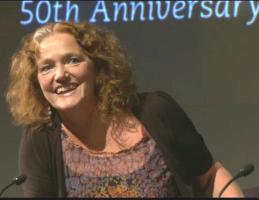
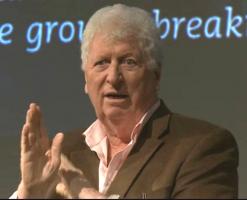
 Doctor Who is to be honoured with a special tribute to be shown at Sunday's BAFTA television award ceremony.
Doctor Who is to be honoured with a special tribute to be shown at Sunday's BAFTA television award ceremony. 
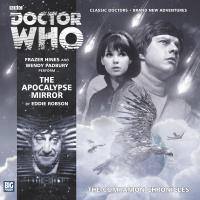


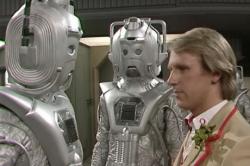 BBC America has chosen
BBC America has chosen 
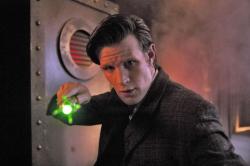

 The tenth in our series of features looking at events leading to the creation of a true TV legend.
The tenth in our series of features looking at events leading to the creation of a true TV legend.






